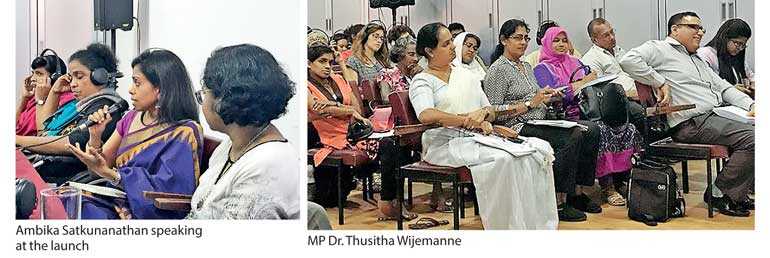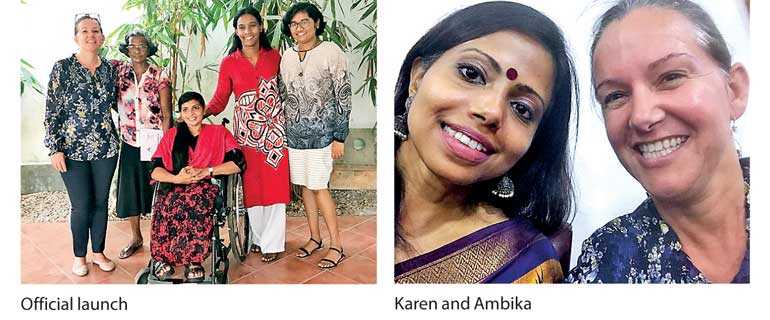Thursday Feb 26, 2026
Thursday Feb 26, 2026
Wednesday, 22 August 2018 00:00 - - {{hitsCtrl.values.hits}}

 Researchers from the Institute for Culture and Society at Western Sydney University, together with the Sri Lankan Law & Society Trust, have officially launched an innovative report documenting the stories of hardship and resilience of Sri Lankan women with disabilities living in war-affected areas.
Researchers from the Institute for Culture and Society at Western Sydney University, together with the Sri Lankan Law & Society Trust, have officially launched an innovative report documenting the stories of hardship and resilience of Sri Lankan women with disabilities living in war-affected areas.
The collaborative report, ‘Out of the Shadows: War-Affected Women with Disabilities in Sri Lanka’ , which was closely developed in conjunction with Sri Lankan women with disabilities and advocates for their rights, was launched by Human Rights Commissioner of Sri Lanka Ambika Satkunanathan, who responded to report recommendations at this week’s launch.
The report was launched at the Sri Lanka Foundation in Colombo, Sri Lanka to key Sri Lankan officials and policy makers, including Dr. Thusitha Wijemanna, Minister of Parliamentary Affairs, and member of the Sri Lankan Women Parliamentarians› Caucus.
Co-author of the report, Dr. Karen Soldatic from the Institute for Culture and Society at Western Sydney University, said key recommendations create a new framework for the social, cultural, and legal transformations of women with disabilities in Sri Lanka – a group who are often considered a burden on society.
“One of the strongest findings of our research shows that despite an excellent emergency health care service available to women with disabilities in Sri Lanka, the same access isn’t available when it comes to the regular health care system,” said Dr. Soldatic.
“Our research has found that by improving access to regular health care services, in addition to improved access to other everyday services such as mobility access and transportation assistance, vulnerable women are empowered to become more self-sufficient.
“This can break the cycle of burden and stigma within society, restores dignity to vulnerable women, and help solve health care problems in the early stages, rather than allowing minor illnesses and issues to progress into chronic or life-threatening conditions.”
The report highlights that the emergency health care system in Sri Lanka is excellent – but similar to any emergency health care system around the world – it can be inundated with cases that could be entirely prevented with better management, and improved access to everyday services that are currently inaccessible or unattainable to vulnerable women.
Research conducted for the project has also highlighted that the cultural, religious, and gender based stigma of vulnerable women, is a contributory factor toward the current treatment and social policies and laws regarding disability.
Further, it highlights how war has exacerbated this – as one woman quoted in the report notes: “I was very happy before the war. Now I have lost everything and I have been living alone. There are many women in our society who live like me.”
The report was officially launched on 24 July at the Sri Lanka Foundation, in Colombo, Sri Lanka, and Dr Karen Soldatic presented her research recommendations, bringing vulnerable women living with disabilities out of the shadows.